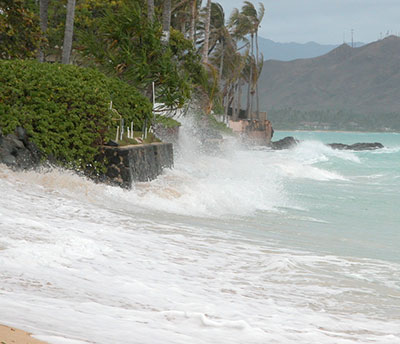This editorial by University of Hawaiʻi at Mānoa William S. Richardson School of Law Associate Dean Denise Antolini; UH Mānoa Department of Earth Sciences Associate Dean for Academic Affairs Charles “Chip” Fletcher; Washington, D.C. Center for Climate Integrity Legal Director Alyssa Johl ran in the Honolulu Star-Advertiser on May 5, 2019.

It’s no secret that climate change is already impacting Hawaii. The years 2015 and 2016 were the hottest on record. Rising sea levels erode precious beaches. Floods and drought are more common. Rainfall has declined over the past century. Tropical cyclones increasingly shift into local waters. There are lurking threats to drinking water, vital ecosystems, buried infrastructure, and urban livability.
Climate change disproportionately impacts indigenous communities with biocultural ties to place. Climate change and the accompanying costs amplify economic disparities, adding to homelessness, under-served neighborhoods, and the inability to afford a home. The Islands’ indigenous foundation provides resilience and wisdom as we address these challenges, but action is needed to support that foundation.
Hawaii’s governor, state Legislature and counties are showing strong leadership in the face of climate change threats—and must continue to do so. Hawaii has ambitious goals for decarbonizing and becoming energy independent.
But even if we save taxpayer money by stopping our addiction to fossil fuel imports, that won’t pay the bill for damages happening now and in decades to come. Some of these costs are, at this point, inevitable: for instance, a minimum $19 billion in developed assets are expected to be compromised by sea level rise flooding by the end of the century.
Hawaii taxpayers and communities should not foot the bill for the climate-induced damages to our islands. On the mainland, 15 local and state governments are using a powerful legal tool to recover these costs. This tried-and-true tort law approach to polluter accountability, called “polluter pays,” builds on more than a century of legal precedent. The lawsuits allege that climate polluters like the oil and gas industry knowingly made climate change worse and must pay their fair share for the damages.
Lawsuits alone will not solve climate change but we must use every tool possible to protect our ecological health and regain past community resiliency. Communities that have filed lawsuits against Big Oil are seeking their day in court and asking that oil companies bear the massive costs of climate change to our daily lives.
Remember the tobacco lawsuits? At first, no one believed that tobacco was harmful or addictive. Now we know the truth. A similar story is unfolding about fossil fuels. According to internal company documents presented in these lawsuits, the oil and gas companies knew full well that the window to act on climate change was rapidly closing as early as the 1980s. Their own scientists warned that a failure to act could lead to consequences that would likely be “irreversible” and “catastrophic.”
Instead of acting to avoid this catastrophe, the fossil fuel industry spent hundreds of millions creating front groups and paying scientists for hire to promote climate denial.
A recent poll by the Center for Climate Integrity showed strong support among Hawaii voters for holding climate polluters responsible for these impacts. Seventy-five percent of those polled agreed that the oil and gas industry should be responsible for some portion of costs to protect communities from climate change. A similar percentage supported litigation against climate polluters.
The high costs of climate change could have been avoided. But given the reality we are facing, it is time that the state and counties seriously examine new approaches.
In our view, legal action may be necessary to compensate for damages to the islands. Hawaii needs to continue to show strong leadership and explore new avenues to address the costs of our climate crisis before irreparable damage is done to the islands.

